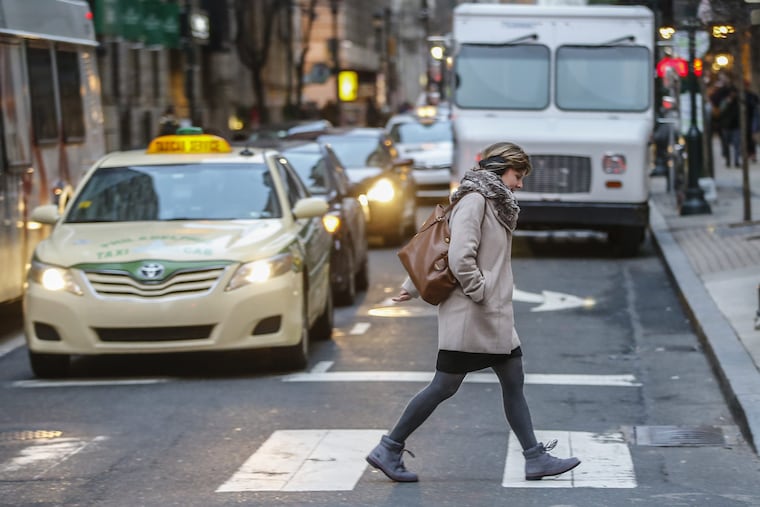Speed cameras highlight year one of Philly’s safe streets project
Speed cameras are a big win for the city, but there is a slate of more improvements ahead.

When speed cameras come to Roosevelt Boulevard in about six months, they will represent the most concrete accomplishment yet of Philadelphia's year-old safe streets initiative.
"It truly is going to save lives," Leslie Richards, Pennsylvania's transportation secretary, said at an event Friday to celebrate the passage of legislation legalizing speed cameras in the city.
Gov. Wolf signed the bill Friday after years of lobbying from the city and safe streets advocates such as the Bicycle Coalition of Greater Philadelphia. The law also legalized a five-year pilot program to place speed cameras in active work zones on Pennsylvania highways.
Last March, Philadelphia adopted a Vision Zero three-year action plan, committing to a philosophy that with education, engineering, and enforcement, traffic-related deaths can be reduced to zero. In Philadelphia, which has a higher rate of traffic deaths than New York City, Boston, or Chicago, the target for zero deaths is 2030. A report issued Friday charting Vision Zero's progress acknowledged that the city was not on track to meet that goal.
>>READ MORE: Speed cameras are likely coming soon to Roosevelt Boulevard
Clear-cut wins are hard to obtain when it comes to improving the quality of the city's streets. The high cost of meaningful road reconfiguration, the need for community input and approval, and the competing interests of city agencies and Council members have slowed progress. The city recently hedged on its commitment to create protected bike lanes, shifting the goal from 30 miles of lanes under the Kenney administration to 40 miles in the next seven years.
Dena Driscoll of the advocacy organization 5th Square credited the city for the progress listed in the report, while tasking the city with committing to better enforcement and a more aggressive road improvement schedule.
"For his entire term, shovel-ready funded projects have been waiting for the mayor's green light," she said. "Time and again — on South Street and Lombard, Pine and Spruce, on 22nd, 10th, and 13th Streets — the mayor has deferred to neighborhood politics, or simply ignored the issues."
>>READ MORE: Truck traffic is clogging Center City streets. What's Philly going to do about it?
Permission to install speed cameras, though, is a tangible step forward in the Vision Zero project. The goal is to slow cars on Roosevelt Boulevard, which just this year has accounted for almost 20 percent of the city's fatal crashes. There have been 13 deaths on the Boulevard this year, and one more on its limited-access stretch, the Roosevelt Expressway.
Half the revenue from the Boulevard cameras will go toward transportation projects in Philadelphia. The rest will go toward state projects.
On about 14 miles of residential streets, speed limits will drop to 25 mph, said Mike Carroll, the city's deputy managing director for the Office of Transportation, Infrastructure, and Sustainability. Those streets have not been selected. Between October and January, the city will take applications from neighborhoods seeking to be designated as "slow zones."
The city is also dedicating $1.5 million to cover the design for five fast-track projects. Of those, none are in Center City. They include safe streets initiatives at two schools, Cramp Elementary and Hamilton Elementary; work at a troubled Roosevelt Boulevard intersection; and corridor improvements on Parkside Avenue and North Broad Street. Speeding the design stage could speed a four-year completion schedule by up to a year and a half.
>>READ MORE: Where are you most likely to be killed by a car in Philadelphia? (Hint: Not Center City)
Embracing projects beyond the city core was one of the priorities for Vision Zero, officials said. When the Kenney administration began, there was awareness that street improvement projects often focused on Center City, Carroll said.
"There was a time we had to shift our focus so that everyone felt included," he said.
One of the speakers Friday was LaTanya Byrd, whose niece and three of her children were killed on Roosevelt Boulevard five years ago. She hailed speed cameras as an important step.
"How many times and how many people have to die," she asked, "before we all come together to do something?"